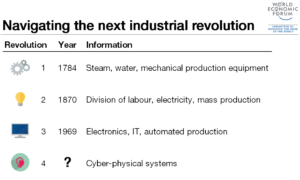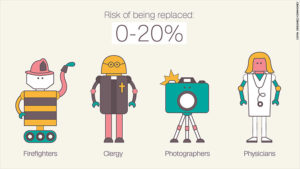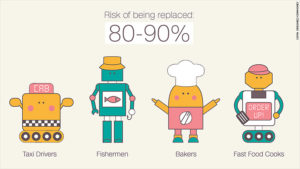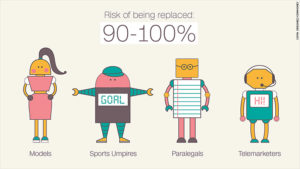In the Fourth Industrial Revolution, Klaus Schwab’s analysis of the argument that robots would take over the jobs of humans kinda put a seal on my prior conviction that automation will never replace me but in the course of writing this article my perspective on this issue has broadened and I’ve gotten to realize that it’s a serious issue worthy of national discussion.
The World Economic forum succinctly explained the transitions between the different industrial revolutions, “The First Industrial Revolution used water and steam power to mechanize production. The Second used electric power to create mass production. The Third used electronics and information technology to automate production. Now a Fourth Industrial Revolution is building on the Third, the digital revolution that has been occurring since the middle of the last century. It is characterized by a fusion of technologies that is blurring the lines between the physical, digital, and biological spheres.”
The question for all industries and companies, without exception, is no longer ” Am I going be disrupted?” but “When is disruption coming, what form will take and how will it affect me and my organization?”
We’re all aware of the imminent threat that automation poses to jobs, A CNN Money article provided the following stats.
Making reference to what Klaus Schwab said in his book,
Compared to the previous industrial revolutions, in the fourth Industrial revolution everything is happening at a faster pace than ever before, there are so many radical changes occurring simultaneously, we have the complete transformations of entire systems.This has two effects namely, Destruction effect: displacement of people from their jobs and the Capitalization effect: demand for new goods and services increases and leads to the creation of new occupations, businesses, and even industries.
It has always been the case that technological innovation destroys some jobs, which it replaces in turn with new ones in a different activity and possibly in another place.
The techno-optimist ask: If we extrapolate from the past, why should it be different this time? They acknowledge that technology can be disruptive but claim that it always ends up improving productivity and increasing wealth, leading in turn to greater demand for goods and services and new types of jobs to satisfy it. The substance of the argument goes as follows: Human needs and desires are infinite so the process of supplying them should also be infinite. Barring the normal recessions and occassional depressions, there will always be work everybody.As human beings, we have an amazing ability for adaptation and ingenuity.
So I thought I was home and dry on the topic, I am techno-optimist or so I thought till my friend Sope sent me this article: A warning from Bill Gates, Elon Musk, Stephen Hawkings and It gave me a graphic image of the potential impact that automation is going to have on people, you should watch the short videos in the article then you’d understand the potential magnitude of job displacement that’s about to hit us. In summary, the article talks about the impact that automation of jobs is going to have on the working population using specific examples such as drivers, salespersons, restaurants employees… and closes with recommendations from Bill gates that we should tax robots and Elon musk that we should adopt universal basic income… Pondering on the issue and looking at the different recommendations I’ve come to a conclusion that issue of automation can be tackled by a two-pronged approach. A short term solution would be Redistribution of wealth i.e. taxing robots and universal basic income, while the long term solution would be Education.
Long term: In terms of education we know that if you stay informed and adapt to the changes happening by learning new skills or changing career paths you’d be fine, however, how do you ensure that millions of people (with different abilities, personalities, beliefs…) do that at the same time to avoid being displaced? Also, new jobs are created as some are lost e.g the advent of social media probably caused some guys to be fired at the postal office because of less demand but then it also brought with it the role of social media manager…The big question is, are the new jobs created enough to cater for the lost ones. The net effect isn’t positive at the moment so that’s why they’re advocating for redistribution of wealth.
Short term: In terms of redistribution of wealth, while we are about the whole education crusade which takes time, the question is what happens to people (stubborn or ignorant) who have been displaced? We have to ensure that they are taken care of. So to them [Gates and musk], education is a given already but then what do we do now?
I agree with the writer of the article earlier mentioned that we need to discuss this issue especially with government and probably control the rate at which new technologies invade the workplace to minimize the effects of the displacement of the jobs. Take for example Uber, I looked into the revolt from Taxi drivers and I saw some sense in the fact that their jobs were being taken and they needed to survive, in Massachusetts the government has been able to tax Uber ‘higher’, using the proceeds to take care or set up stuff for the displaced taxi drivers.
At the end of the day, I realized that I have a greater responsibility to educate people on the potential impact of automation, so yes most people know that robots are taking over but how and when? what are the latest trends? What can they do to avoid being displaced?
You have to be constantly reinventing yourself and investing in the future.Reid Hoffman





Leave a Reply